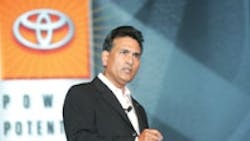When an executive of Toyota Motor Sales U.S.A. recently predicted North American sales of about 600,000 hybrids early in the next decade, he wasn't referring to lift trucks -- yet!
Jim Press, president and COO of the company's U.S. motor car operations, has a hybrid-products development edge over Shankar Basu, president and CEO of Toyota Material Handling U.S.A. (TMHU). In the next decade 10 Toyota hybrid automobile models will be introduced in the global auto markets.
While Toyota's hybrid car sales have grown from 134,690 last year to 82,580 for the first five months of 2005, hybrid Toyota lift trucks are still in development, says Irvine, Calif.-based Basu. (He also expects the eventual commercial application of fuel cells to lift trucks.)
Press predicts hybrid vehicles may comprise roughly 25% of Toyota's U.S. auto sales in the next decade, but don't consider that to be a bellwether for lift trucks, says TMHU's Brett Wood, national product development, strategy planning and marketing services manager.
Within Toyota, both product sectors heavily emphasize customer service. At TMHU the latest evidence is the recent opening of an $11 million National Customer Center at its manufacturing site at Columbus, Ind. "We wanted to demonstrate to our customers how important they are to Toyota," says Basu, who earlier served as group vice president of Toyota Motor Sales U.S.A. Inc.
TMHU also seeks to satisfy the needs of those customers with a solution that defies automotive analogy -- automated-guided vehicles (AGVs), the robot-like material-handling alternative to lift trucks. Following the formal opening of the Customer Center, Wood unveiled an AGV prototype.
Wood says AGVs are rapidly becoming the preferred method of making deliveries to assembly lines.
In some areas, such as fuel cells, lift truck innovation may be out-pacing automotive activity. For example, in July Wal-Mart Stores Inc. concluded its first trial run with collaboration by Cellex Power Products Inc., Vancouver, and Crown Equipment Corp., New Bremen, Ohio.
